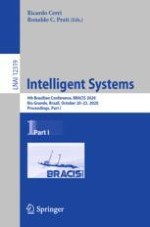2020 | OriginalPaper | Chapter
Semi-Supervised Sentiment Analysis of Portuguese Tweets with Random Walk in Feature Sample Networks
Authors : Pedro Gengo, Filipe A. N. Verri
Published in: Intelligent Systems
Publisher: Springer International Publishing
Activate our intelligent search to find suitable subject content or patents.
Select sections of text to find matching patents with Artificial Intelligence. powered by
Select sections of text to find additional relevant content using AI-assisted search. powered by
